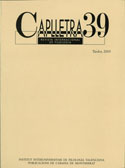«Mala domna» i «Dona de mal»: el rebuig de l'estimada infidel per part dels trobadors i dels poetes catalans de l'edat mitjana
DOI:
https://doi.org/10.7203/caplletra.39.4856Paraules clau:
medieval Occitan literature, medieval Catalan literature, mala cansó, maldit, medieval literary misogyny Resum
Resum
The Occitan «mala cansó» of the twelfth and thirteenth centuries and the Catalan «maldit» of the fourteenth and fifteenth centuries both display a singular aspect of medieval literary misogyny. In both cases criticism is not levelled against women in general, but against a particular lady who has been previously loved by the poet and is now rejected. The poet blames her directly and harshly because, after leaving him, she has given herself to a man from an inferior social background. As a result, the poet bids farewell to her and moves away. Some of the Catalan poets of the Middle Ages persisted in this literary outlet. They borrowed for their own «maldits» the motifs and
expressions that were characteristic of the break-up and the violent farewell, and adapted them to their own language and to the bourgeois environment of the towns.
 Descàrregues
Descàrregues
Descàrregues
Publicades
Com citar
-
Resum653
-
PDF164
Número
Secció
Llicència
L’autor o autora que adrece un treball a la redacció de Caplletra perquè siga publicat ha de ser la persona titular legítima dels drets d'explotació. La legitimació per a la publicació del treball ha d’incloure també les imatges, les taules, els gràfics i altres materials que puguen complementar el text, amb independència de si n'és l'autor o autora.
Copyright. Quan publica el treball en la revista, l'autor o autora cedeix a Caplletra. Revista Internacional de Filologia els drets d'explotació (reproducció, distribució i comunicació pública), tant per a l'edició impresa en paper com per a la versió electrònica, que serà accessible mitjançant la xarxa Internet.
Tots els treballs publicats en Caplletra es troben sota una llicència Creative Commons del tipus Reconeixement-NoComercial-SenseObraDerivada 4.0.
RESPONSABILITAT
Caplletra. Revista Internacional de Filologia no s'identifica necessàriament amb els punts de vista mantinguts en els treballs que publica.
Caplletra. Revista Internacional de Filologia declina tota responsabilitat derivada de qualsevol vulneració eventual dels drets de propietat intel·lectual que poguera ser duta a terme pels autors o autores.






